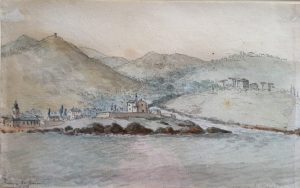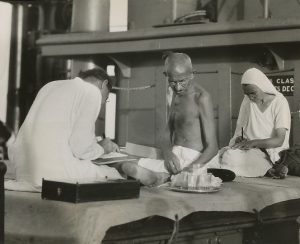October 1, 2018, by Stephen Legg
‘On being at sea: historically experiencing movement across the waves’: a panel at the RGS-IBG Conference, Cardiff, August 2018
In this panel at the annual RGS-IBG conference Jake Hodder and myself collated five papers that encouraged us to reflect on non-earth (but still Earth-bound) geographies. It had become apparent during our research into interwar international conferences that transit was an essential part of the conference experience, and conference labour. Although the interwar period was one of accelerating time-space compression it was still one in which most journeys to conferences were by sea and were (by today’s standards) relatively ponderous. This set us to thinking about how we might consider these journeys at sea, what we can know about them, and how they affected the way people related both to their destination and their place of departure. We posed some of the following questions in the call for papers from which this session emerged:
“What did people do on the waves? What friendships or solidarities were forged there? How were class, race, sex and gender hierarchies reproduced or overturned aboard ship (or beneath deck)? We would like to explore these historical experiences but also use them to ask whether we can, now, reproduce the historical experience of being seaborne. Were such journeys ephemeral, and should they remain so? Were such journeys liminal, allowing transgressive practices which we should leave at sea? What sort of method, therefore, should we adopt after casting off, and why?”
The resulting session was composed of five papers. Charles Watkins and Pietro Piana presented research conducted alongside Ross Balzaretti at the University of Nottingham under the title “The mountains from the sea: perception, representation and exploration of the Ligurian coast by British visitors c. 1770-1915”. They presented an overview of changing relationships between land, sea and the representation of the north-west coast of Italy, between Monaco and Pisa, taking in the port of Genoa. They showed how sea travel was intimately linked to the land (exemplified in the notion of ‘coasting’), whether because the dangers of land travel in the pre-1815 period made sea journey safer (despite the risk of corsair attacks at sea) or because it provided a location from which to sketch the coast, whether for scientific and navigational purposes or for sheer aesthetic enjoyment.
Jimmy Packham and Laurence Publicover outlined their ongoing research, from the perspective of English literature, which explores the sea from underneath, to re-imagine it as a vertical, and wet, space. Their studies of the deep sea in “Words that flicker and flutter and beat: The Poetry of Deep Sea Cables” argued that literature penetrated the deep, as much as submarines, dredgers, salvage ships and deep-sea miners. Telegraph cables provided a medium to think about words passing under the seas, whilst also providing a hook (sorry) upon which to hang poetic meditations on the deep. Perhaps the best known of these is Kiplings’ “Deep Sea Cables”, posing these cables as both slimy infrastructure and heralds of globalisation (also see the accompanying illustrations):
The wrecks dissolve above us; their dust drops down from afar— Down to the dark, to the utter dark, where the blind white sea-snakes are. There is no sound, no echo of sound, in the deserts of the deep, Or the great grey level plains of ooze where the shell-burred cables creep. Here in the womb of the world—here on the tie-ribs of earth Words, and the words of men, flicker and flutter and beat— Warning, sorrow and gain, salutation and mirth - For a Power troubles the Still that has neither voice nor feet. They have wakened the timeless Things; they have killed their father Time; Joining hands in the gloom, a league from the last of the sun. Hush! Men talk to-day o'er the waste of the ultimate slime, And a new Word runs between: whispering, 'Let us be one!'Rudyard Kipling (1893) The Deep Sea Cables
Kimberley Peters returned us to the surface with her presentation on “Intimacy and the ocean: making waves on the pirate radio vessel, 1964-1991”. Here she examined the 26 years at sea spent by pirate radio broadcasters in the North Sea. Whilst her previous work has examined this venture in geo-legal terms, instead she reflected upon the cramped and intimate on-board spaces of cohabitation that the broadcasters shared. DJs of the airwaves rather than mariners of the seawaves, this was no less a perilous profession. Three to four months would be spent aboard ship, in spaces of social and sexual experimentation to which listeners (including DJs on land leave) developed strong and emotional attachments.
Andy Davies presented the first of two concluding papers focusing on politics, nationalism and the sea relating to colonial India. In “From Riverine to Maritime: Ships spaces as conduits of anticolonial radicalism in India’s Swadeshi movement”. Andy referenced criticisms of the study of India nationalism being too terracentric and proposed a study of the sea lanes through which anticolonial nationalists moved around the Indian coast, especially between British and French territories like Pondicherry. Rather than rely on British sea travel in 1906 the Swadeshi Steam Navigation Company was established to challenge the British monopoly, to the approval of Aurobino Ghosh, who wrote that if you held the waterways, you could hold British wealth and the communications of empire.
Stephen Legg concluded with “Delegates at Sea: a Mobile Conference between India and England?” This paper considered what delegates to the Round Table Conference (1930-32) did aboard the P&O steamships that the Government of India chartered for travel to and from Britain. I suggested that the ships were places of work and socialisation, both of which functioned to extend the space of the conference into the seas, and the time of the conference to include the journeys to and from Europe. Work could be harmonious but also fractious (especially in terms of Hindu-Muslim tensions). Socialisation tended to be disciplined into the routines and strictures of first-class society, but the ship could also prove a space of social upturning, as Gandhi’s spiritual journey across the waves amply demonstrated.
No comments yet, fill out a comment to be the first



Leave a Reply